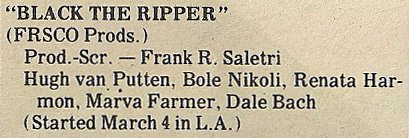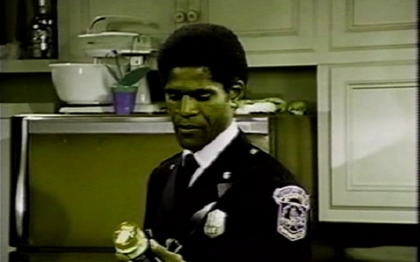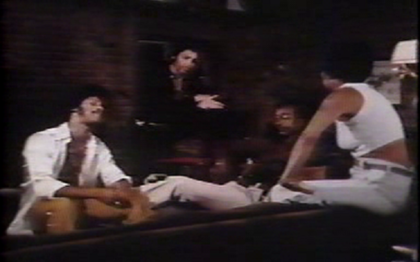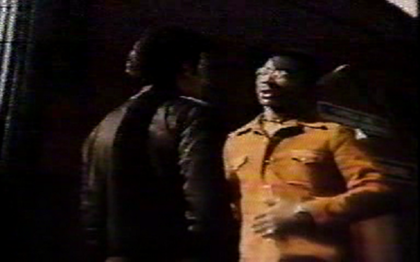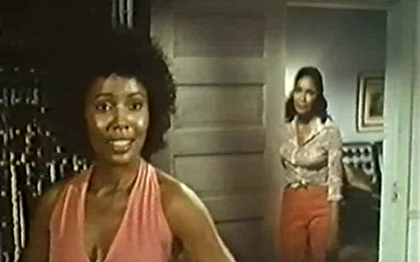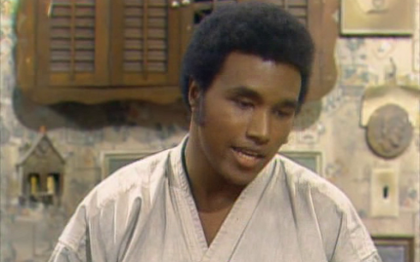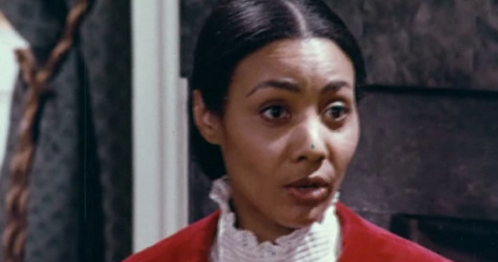Black the Ripper (lost blaxploitation horror film; existence unconfirmed; 1974-1976): Difference between revisions
No edit summary |
No edit summary |
||
| Line 5: | Line 5: | ||
|status=<span style="color:grey;">'''Existence unconfirmed'''</span> | |status=<span style="color:grey;">'''Existence unconfirmed'''</span> | ||
}} | }} | ||
'''''Black the Ripper''''' is an alleged blaxploitation horror film that may have been released around years 1974 through 1976.<ref> [http://dailygrindhouse.com/thewire/black-the-ripper-1975/ Daily | '''''Black the Ripper''''' is an alleged blaxploitation horror film that may have been released around years 1974 through 1976.<ref> [http://dailygrindhouse.com/thewire/black-the-ripper-1975/ Daily Grindhouse article on ''Black the Ripper''.] Retrieved 15 Jul '20</ref> The movie was a blaxploitation take on the Jack the Ripper story. | ||
It is thought that Frank Saletri (the writer of earlier genre horror movie ''Blackenstein'') may have been the director, but ''Black the Ripper'' is otherwise shrouded in mystery. It was first mentioned in a brief note in the May 8th, 1974 issue of ''Variety'' magazine that named Saletri and a cast of unknown actors, and indicated the film was two months into production. This was updated in the February 25th, 1976 issue of ''Variety'', which claimed that the film was planned as a Memorial Day release. | |||
This release didn't happen. Indeed, the movie's existence would not be mentioned again until 2013, when a user of a website for obscure films claimed to have seen it once while browsing torrent files. Another user of the same website released what are supposedly the only known screenshots. Due to the extremely obscure nature of the film, it cannot be confirmed if it finished production or ever saw a theatrical release. | |||
==Background== | ==Background== | ||
From the early to mid-1970s, a | From the early to mid-1970s, a number of movies starring black actors was released in order to appeal to the African-American urban audiences. The genre was nicknamed "blaxploitation" and the resulting films are celebrated today for their freedom to show off a uniquely Black point of view, including several takes on existing horror and other genre properties. Besides this niche focus, many blaxploitation films were independently produced, and the results generally lacked mainstream marketability, playing mainly in smaller theatres in larger urban centres.<ref>[https://www.britannica.com/art/blaxploitation-movie Encyclopedia Britannica article on blaxploitation films.] Retrieved 15 Jul '20</ref> | ||
== | ==Available Details== | ||
Those who claim to have seen the movie have noted that the film seemed hastily put together and was overall incomplete, with several seemingly missing scenes. There is an opening credit sequence with a song credited to Mara Farmer, but no ending credits. In the opening credits, alongside Frank Saletri as director, Michael Finn is listed as writer. While not confirmed, it is possible that this is the same Michael Finn who directed the 1974 genre film ''The Black Connection''. This theory is more plausible since''The Black Connection'' was filmed in Las Vegas, where Frank Saletri was known to have lived. | |||
==Plot== | ==Plot== | ||
The film is claimed to open in a karate studio, where a character named Mike is training students. The training is interrupted by a phone call from a student who calls Mike to inform him that he will not be in due to his sister being murdered. The student further discloses that he had told his sister not to go to a character named Sideback. Mike begins to take the investigation into his own hands after the police are of no help and begins to track down Sideback. As Mike is asking a prostitute questions about the murder, a voice (who many claim sounds familiar to Antonio Fargas) is heard off-screen and the character Sideback appears. | |||
A fight between Sideback and Mike breaks out | A fight between Sideback and Mike breaks out. Both are then arrested and taken to jail, but are cleared when another murder occurs. After this, the film is said to take a strange turn, shifting focus to a mild-mannered Caucasian accountant named Todd, whom we first see interacting awkwardly with his attractive black secretary Carla. Todd asks Carla out on a date, and when she politely declines mutters "You deserve everything you’re going to get, strumpet" to himself as he walks away. The film then cuts to Todd sleeping where he dreams of picking up a black prostitute in Victorian-era London. | ||
The film cuts back to Mike who is somehow now in charge of the police investigation, and also in a relationship with Carla (any scenes establishing either of these things are presumed to be among thr lost). He receives an anxious call from her, as she has noticed the case in the paper and had overheard Todd mumbling to himself. The cops agree to keep on eye on Todd. Later in the evening, Mike is at Carla's house but has gone for food when Todd strikes, killing Carla's roommate. Mike then returns and sees Todd trying to kill Carla. This leads to the final fight and results in Todd being thrown out of a third-story window. | |||
==Cast and crew== | ==Cast and crew== | ||
*Frank R. Saletri | *Directed by Frank R. Saletri | ||
*Michael Finn | *Written by Michael Finn | ||
*Hugh Van Putten possibly Mike | *Hugh Van Putten, possibly Mike | ||
*Bole Nikoli | *Bole Nikoli | ||
*Renata Harmon | *Renata Harmon | ||
*Marva Farmer | *Marva Farmer | ||
*Dale Bech | *Dale Bech | ||
It is also possible though not confirmed that Antonio Fargas | It is also possible though not confirmed that Antonio Fargas (previously best known as informant Huggy Bear on ''Starsky & Hutch'') played the character Sideback. | ||
== | ==Availability== | ||
''Black the Ripper'' has yet to be confirmed | The existence of ''Black the Ripper'' has yet to be confirmed. While a few people have claimed to have seen it on torrent and the website Dailygrindhouse.com has an article that goes into great detail about the film, it is not available in any official form, and no-one named as connected with the production has come forward to confirm their involvement. At best it seems to have been hastily produced (or perhaps salvaged after being initially scrapped, which would help explain both the disjointed nature of the finished film and its extreme obscurity) for a possible minor local release, similar to many blaxploitation films of the time, and simply was not thought worthy of preservation. | ||
==Gallery== | ==Gallery== | ||
Revision as of 22:43, 24 April 2021
Black the Ripper is an alleged blaxploitation horror film that may have been released around years 1974 through 1976.[1] The movie was a blaxploitation take on the Jack the Ripper story.
It is thought that Frank Saletri (the writer of earlier genre horror movie Blackenstein) may have been the director, but Black the Ripper is otherwise shrouded in mystery. It was first mentioned in a brief note in the May 8th, 1974 issue of Variety magazine that named Saletri and a cast of unknown actors, and indicated the film was two months into production. This was updated in the February 25th, 1976 issue of Variety, which claimed that the film was planned as a Memorial Day release.
This release didn't happen. Indeed, the movie's existence would not be mentioned again until 2013, when a user of a website for obscure films claimed to have seen it once while browsing torrent files. Another user of the same website released what are supposedly the only known screenshots. Due to the extremely obscure nature of the film, it cannot be confirmed if it finished production or ever saw a theatrical release.
Background
From the early to mid-1970s, a number of movies starring black actors was released in order to appeal to the African-American urban audiences. The genre was nicknamed "blaxploitation" and the resulting films are celebrated today for their freedom to show off a uniquely Black point of view, including several takes on existing horror and other genre properties. Besides this niche focus, many blaxploitation films were independently produced, and the results generally lacked mainstream marketability, playing mainly in smaller theatres in larger urban centres.[2]
Available Details
Those who claim to have seen the movie have noted that the film seemed hastily put together and was overall incomplete, with several seemingly missing scenes. There is an opening credit sequence with a song credited to Mara Farmer, but no ending credits. In the opening credits, alongside Frank Saletri as director, Michael Finn is listed as writer. While not confirmed, it is possible that this is the same Michael Finn who directed the 1974 genre film The Black Connection. This theory is more plausible sinceThe Black Connection was filmed in Las Vegas, where Frank Saletri was known to have lived.
Plot
The film is claimed to open in a karate studio, where a character named Mike is training students. The training is interrupted by a phone call from a student who calls Mike to inform him that he will not be in due to his sister being murdered. The student further discloses that he had told his sister not to go to a character named Sideback. Mike begins to take the investigation into his own hands after the police are of no help and begins to track down Sideback. As Mike is asking a prostitute questions about the murder, a voice (who many claim sounds familiar to Antonio Fargas) is heard off-screen and the character Sideback appears.
A fight between Sideback and Mike breaks out. Both are then arrested and taken to jail, but are cleared when another murder occurs. After this, the film is said to take a strange turn, shifting focus to a mild-mannered Caucasian accountant named Todd, whom we first see interacting awkwardly with his attractive black secretary Carla. Todd asks Carla out on a date, and when she politely declines mutters "You deserve everything you’re going to get, strumpet" to himself as he walks away. The film then cuts to Todd sleeping where he dreams of picking up a black prostitute in Victorian-era London.
The film cuts back to Mike who is somehow now in charge of the police investigation, and also in a relationship with Carla (any scenes establishing either of these things are presumed to be among thr lost). He receives an anxious call from her, as she has noticed the case in the paper and had overheard Todd mumbling to himself. The cops agree to keep on eye on Todd. Later in the evening, Mike is at Carla's house but has gone for food when Todd strikes, killing Carla's roommate. Mike then returns and sees Todd trying to kill Carla. This leads to the final fight and results in Todd being thrown out of a third-story window.
Cast and crew
- Directed by Frank R. Saletri
- Written by Michael Finn
- Hugh Van Putten, possibly Mike
- Bole Nikoli
- Renata Harmon
- Marva Farmer
- Dale Bech
It is also possible though not confirmed that Antonio Fargas (previously best known as informant Huggy Bear on Starsky & Hutch) played the character Sideback.
Availability
The existence of Black the Ripper has yet to be confirmed. While a few people have claimed to have seen it on torrent and the website Dailygrindhouse.com has an article that goes into great detail about the film, it is not available in any official form, and no-one named as connected with the production has come forward to confirm their involvement. At best it seems to have been hastily produced (or perhaps salvaged after being initially scrapped, which would help explain both the disjointed nature of the finished film and its extreme obscurity) for a possible minor local release, similar to many blaxploitation films of the time, and simply was not thought worthy of preservation.
Gallery
References
- ↑ Daily Grindhouse article on Black the Ripper. Retrieved 15 Jul '20
- ↑ Encyclopedia Britannica article on blaxploitation films. Retrieved 15 Jul '20
